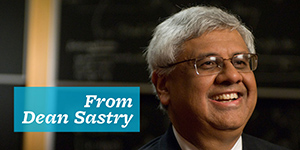
Science and the public good
 As a member of the Scientific Advisory Board of the Secretary-General of the United Nations, I am privileged to be part of a powerful effort to advance the international community’s development agenda.
As a member of the Scientific Advisory Board of the Secretary-General of the United Nations, I am privileged to be part of a powerful effort to advance the international community’s development agenda.
In 2000, U.N. leaders set forth an ambitious initiative known as the Millennium Development Goals that were designed to alleviate poverty; provide access to education; improve child and maternal health, gender equality and environmental sustainability; reduce HIV/AIDS and strengthen global partnerships.
The deadline to make measurable progress on these goals was this year. The good news, based on recent U.N. surveys, is that between 1990 and 2015, the number of people living on the equivalent of $1.25 a day, the agreed-upon metric to measure extreme poverty, was cut in half.
Despite this enormous stride, an estimated 800 million people still live in extreme poverty across the globe. In nations with emerging economies, only four in ten young people aged 15-24 are employed — a number that has slipped from five in ten in 1991. While the number of undernourished people has been cut in half, 90 million children under the age of five still suffer from malnutrition.
At the U.N. General Assembly meeting earlier this fall, the U.N. set the agenda to guide the next 15 years with the Sustainable Development Goals.
My aim, voiced through the recommendations of the Scientific Advisory Board, is to ensure that the future vision for reaching U.N. goals makes the most of innovations in science and technology to create and launch sustainable development projects.
As reflected here at Berkeley, from undergraduate projects to faculty research, human-centered, inclusive and adaptable technologies are capable of staggering impact. And we know that to be effective, novel technologies — such as electrochemical remediation for clean water and sanitation, off-grid energy solutions, nanotech for food security and technologies for health imaging, diagnostics and therapeutics — need to suit existing local knowledge, resources and political context.
Many breakthroughs in science and technology are the result of the data revolution. Data drives innovation, which in turn improves data gathering and dissemination. But the system works only if we can mitigate the data divide between rich and poor, use data responsibly and expand data access for all.
We also know that inclusivity requires an accessible STEM pipeline. The future needs engineers and scientists, along with technicians, mechanics, software developers, builders and lab assistants. Particularly in development, access to vocational schools and job training will be as fundamental to the success of novel solutions as access to higher education.
I look forward to reporting on further progress, and I welcome your comments at dean_sastry@berkeley.edu.
S. Shankar Sastry
Dean and Carlson Professor of Engineering
